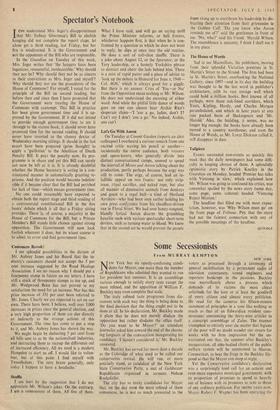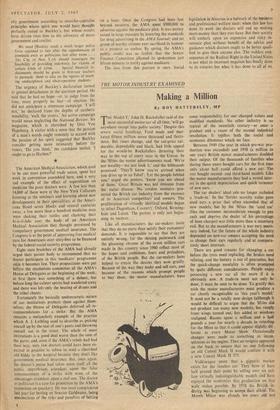Some Secessionists
From MURR
AY KEMPTON
NEW YORK
NEW York has six openly-confessing candi- dates for Mayor, one more than the number of Republicans who admitted they wanted to run for president last summer. It is an assemblage various enough to satisfy every taste except the most refined, and the apparition of William F. Buckley may even complete that scale.
The truly refined taste progresses from dis- content with each way the thing is being done to the final decision that the thing ought not to be done at all. In'his declaration, Mr. Buckley made it plain that he does not merely disdain the opposition but rather disdains the office itself. `Do you want to be Mayor?' an attendant journalist asked him toward the end of the charm- ing languors of the convocation inaugurating his candidacy. 'I haven't considered it,' Mr. Buckley answered.
Mr. Buckley has served for more than a decade as the Coleridge of what used to be called our conservative revival. He will run, or more precisely stand, as candidate of the New York State Conservative Party, a sect of Goldwater Republicans organised to torment Nelson Rockefeller.
The city has so many candidates for Mayor that, on the day even the most refined of them announces, he is not so much presented to the voters as processed through a ceremony of general mobilisation by a permanent cadre of television cameramen, sound engineers and reporters bankrupt in the passions. Buckley rose marvellously above a process which demands of its victims the most abject solicitude for the love or at least the goodwill of every citizen and almost every politician. He read for the cameras his fifteen-minute statement of principles in a tone like nothing so much as that of an Edwardian resident com- missioner announcing the thirty-nine articles to a conscript assemblage of Zulus. The manner triumphed so entirely over the matter that legions of the poor will no doubt wander our streets for weeks with no firm impression but the un- warranted one that, the summer after Buckley's inauguration, all able-bodied clients of the public welfare system will be summoned to Sharon, Connecticut, to beat the frogs in the Buckley lily- pond so that the Mayor can sleep at night.
Yet the Conservative .candidate's declaration was a surprisingly loud call for an activist and even more expensive municipal government, with its proportion of promises to spend as heavily out of balance with its promises to save as those of any ordinary politician. For twelve years now, Mayor Robert F. Wagner has been operating the
city government according to anarcho-capitalist principles whose spirit one would have thought perfectly suited to Buckley's, but whose results have driven even him to the advocacy of more government and costlier.
We need [Buckley read] a much larger police force enjoined to lust after the apprehension of criminals even as politicians lust after votes . . . The City of New York should investigate the feasibility of providing indemnity for victims of certain kinds of crime . . . Special financial in- ducements should be given to first-rate teachers to persuade them to take on the rigours of teach- ing undisciplined and uhco-operative students.
The urgency of Buckley's declaration turned to genteel detachment in the question period. He said that he had no hope—or, to judge from the tone, more properly no fear—of election. He did not anticipate a strenuous campaign. '1 will not,' he declared from the depths of aesthetic sensibility, 'walk the streets.' An active campaign would mean neglecting the National Review, his magazine, which is cherished by Otto Von Hapsburg. A visitor with a sense that the passion of a man's words ought remotely to accord with the passion of his spirit suggested that Buckley consider getting more intimately before the voters. 'Do you think,' the candidate smiled, 'I ought to go to Harlem?'
The American Medical Association, which used to be our most powei:ful trade union, spent last week in convention assembled here, and a very sad example of the effect of superstition on medicine the poor doctors were. A few less than 14,000 of them were at the New York Coliseum listening to the seminars and learning about new developments in their specialities: at the Ameri- cana Hotel seven blocks and several centuries away, a few more than a hundred medicine men were shaking their rattles and chanting their hi-le-li-lahs over the body of an American Medical Association they thought possessed by compulsory government medical insurance. The Congress is at the point of approving free medical care for Americans over sixty-five to be financed by the federal social security programme.
Eight state branches of the AMA had already urged their parent body to recommend that no doctOr participate in this 'medicare' programme once it becomes law. Their propositions were put before the resolutions committee of the AMA's House of Delegates at the beginning of the week; at first there was something of a debate, but before long the calmer spirits had wandered away and there was left only the beating of drums and the tribal chants.
Fortunately the basically undemocratic nature of our institutions protects them against them- selves; the House of Delegates deferred all re- commendations for a strike. But the AMA remains a melancholy example of the practice which A. J. Leibling used to describe as picking oneself up by the seat of one's pants and throwing oneself out in the street. The whole of most institutions is a good deal worse than the sum of the parts; and, even if the AMA's rebels had had their way, very few doctors could have been ex- pected in practice to refuse to send a cherished old biddy to the hospital because they don't like government medical insurance. But, once again. the doctor's union had taken upon itself all the public opprobrium attendant upon the false announcement of a strike with none of the advantages attendant upon a real one. The doctor as politician is a case for protection by the AMA's committee on quackery. He was most conspicuous last year for betting on Senator Goldv;rater, being unconscious of the risks and penalties of betting
on a loser. Once the Congress had been lost beyond recovery, the AMA spent $900,000 to advertise against the medicare plan. It was money raised in large measure by lowering the standards for drug advertising in the AMA Journal; and no group of worthy citizens ever sacrificed its honour to a purpose so useless. By spring, the AMA's public credit was so forfeit that the Senate Finance Committee allowed its spokesman just fifteen minutes to testify against medicare.
The loss from this posture is ours. Social legislation in'AMerica is a bulwark of the business and professional welfare state; when this law has done its work the doctors will end up making More money than they ever have. But their society will embark upon an expensive and risky in- surance plan without benefit of the advice and guidance which doctors ought to be better quali- fied to give than anyone else. The saddest con- sequence of the Radical Right in the United States is not what its incessant negation has finally done to its votaries hut what it has done to all of us.











































 Previous page
Previous page